A digital counting scale is a specialized scale used in industrial applications. The innovative technology is designed to quickly and accurately count multiple identical parts. More than simply high capacity and accurate weighing capabilities, digital counting scales work by weighing a known quantity of similar items and then calculating the number of items in a larger batch based on the weight. Essentially, digital scales take weight information and convert that data into valuable count information with unparalleled precision. (more…)
Choosing the Correct Scale for Your Industrial Application
An industrial weighing scale is a device used to measure the weight or mass of objects in various industrial settings. Compared to other scales, industrial weighing scales are designed to handle a broader range of load capacities with greater accuracy for specific industrial applications. Choosing the correct scales is not just a necessity but vital for the overall success of companies that rely on weight-based transactions as a means of business. (more…)
6 Factors to Consider Before Purchasing an Industrial Scale
Is your company considering the purchase of an industrial scale? If so, when buying scales you should carefully consider several important factors about the specific needs of the business before finalizing their purchase. Industrial scales are specifically engineered to handle large and heavy loads commonly found in industries such as manufacturing, logistics, recycling and redemption, agriculture, construction, and the like. Industrial weighing scales come in various sizes and types, including floor scales, bench scales, crane scales, and truck scales, each tailored to suit specific weighing needs.
If your company is in the market for an industrial scale, here are 6 important factors to consider before you make your final decision: (more…)
How Often Does a Weighing Scale Need to Be Calibrated?
For many industries, weighing scales calibration is vital for maintaining precision and accuracy in weight measurements necessary for business. Though knowing how to calibrate a weight scale is good for business, having a third-party industrial scale calibration service regularly calibrate your company’s scales will assure customers and regulatory agencies that your weighing systems are accurate and reliable. (more…)
Types of Display Screens Based on Scale Application
A key component to any weighing system or set of commercial scales is the weighing scale display screens that provide operators with the necessary data and information about their industry’s weight measurement. Scale display screens come in various types, each with its own unique characteristics and advantages.
Types of screens can vary depending on several factors and the specific needs or requirements of the commercial or industrial weighing operation at hand. The three leading display types used in weighing system applications or with commercial scales are the digital LCD, touch screen, and graphic display. Here’s what distinguishes one from the other and the applications they are suited for:
Digital LCD Display Screen
Digital LCD (Liquid Crystal Display) screens are the most common display component for electronic weighing scales. They are regarded for their clarity, readability, and adaptability with many devices. LCDs are a cost-effective option, too. They feature backlighting for easy reading in low-light conditions, and many have connectivity options like Wi-Fi to sync data with smartphones or other devices.
As letters and numbers are formed from limited shapes, LCD screens have more limited display capabilities than touch screen or graphic displays, but they’re still highly effective, providing users with precise and easily readable weight information. LCD screens typically display numerical values representing the weight measurement in various units—pounds, kilograms, or ounces—depending on the scale’s settings.
LCD weighing scale display screens are used in various applications requiring weight measurement and display. They are often used with retail and commercial scales, with industrial scales in factories, warehouses, shipping, and production facilities, precision scales used in laboratories, with medical and health-related scales, for weight readouts in mining and construction materials and equipment, and transportation and logistics hubs for determining the weight of vehicles and their loads.
Touch Screen Display Screen
As the name suggests, touchscreen displays incorporate a digital interface that responds to touch rather than physical buttons or keys. Known for their versatility, users interact with the display by simply tapping, swiping, or entering numerical data directly on the screen. These displays can show various kinds of information, including weight measurement, totals, tare weight, and more, all on a single screen.
Touch screen displays allow for user-friendly, often intuitive, interactions and include features for users to navigate different scale functions. For example, data logging capabilities are, literally, at the touch of a finger, allowing users to record and store weight measurements for future reference or analysis. Customized setting features enable users to configure the display layout, units of measurement, and other settings to suit their specific application needs. Depending on the scale’s features, touchscreen displays may have connectivity options for USB or Wi-Fi to enable data transfer to other devices or systems for further processing, inventory control, and analysis.
Such scales are commonly used in various industries, including industrial and manufacturing, shipping, warehouse and logistics, medical, healthcare and pharmaceuticals, laboratory and scientific, and agricultural, where precise and accurate weight measurements are required.
Graphic Display Screen
Graphic display screens are specialized electronic screens or monitors used with a weighing system or balance, sometimes called a weight indicator display or scale display. Graphic display screens are designed to display weight-related information in a user-friendly and easily readable format. In other words, these screens provide visual feedback for users and operators, making reading and interpreting weight-related information easier.
Unlike touch screens, graphic displays provide easy-to-use, menu-driven options and navigation via the touch of a button. This feature is especially useful in laboratory, medical and healthcare, pharmaceutical, and food and beverage environments where gloves are necessary and would otherwise interfere with a touch response.
Menu-driven features at the touch of a button allow users to scroll through and select choices on the instrument panel easily. Weight is displayed in numerical values in various units such as kilograms, pounds, grams, ounces, etc., and, depending on the display capabilities, can offer graphical representations of weight data, such as bar graphs, pie charts, or other visual indicators, to provide users with a more intuitive understanding of the weight being measured.
These screens are commonly found in various industries and applications, including manufacturing, agriculture, retail, healthcare, laboratories, transportation, and more. Their primary purpose is to provide users and operators with accurate, easily readable visual feedback of weight information to support efficient and precise measurement processes.
Contact the Experts at Worcester Scale Company
Overall, weigh scale display screens are pivotal in providing industries with accurate and easy-to-read weight measurements. The features and complexity of the display can vary depending on the type and purpose of the scale. Worcester Scale Company offers a complete line of electronic scales and can help ensure you use the weighing scale display screen best suited for your applications. For over 70 years, we have provided our customers with affordable and effective weighing solutions. Contact us today for more information on weighing scale display screens for your weighing systems and commercial scales.
Purchase by Worcester Scale Company – Bay State Scale & Systems
Worcester Scale Company is proud and excited to announce the purchase of the assets and good name of Bay State Scale starting immediately. We would like to take this opportunity to thank you for the level of business you have provided Bay State Scale in the past and to assure you of our efforts going forward to continue to ensure your satisfaction. We recognize the long and successful history of Bay State Scale in the commonwealth, along with the distinguished name of the Spatz family, and we can only guarantee we will do our best to meet that same level of excellence. (more…)
Types of Physician and Healthcare Scales
Healthcare professionals and the healthcare industry worldwide use physician and healthcare scales. From monitoring a patient’s health to advancing public health, physician and health scales are used for various health-related applications. The scales are designed to provide accurate and reliable readings in assessing a patient’s health status, tracking changes over time, and making informed health decisions. (more…)
What is Force Measurement Systems?
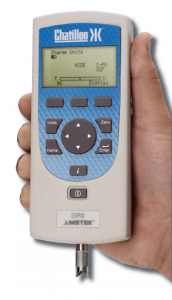
Why Choose a Counting Scale
A precision counting scale is a device used to monitor and manage inventories of materials and goods in many industrial environments. The devices are special tools that can quickly and accurately convert weight information into quantifiable data. Counting scales not only display a count of the number of items placed on the scale but also how much each object weighs. Typically found in production facilities, factories, assembly lines, warehouses, and distribution centers, counting scales significantly reduce the time it takes to track inventories manually. In particular, a counting scale is ideal for counting large volumes of small identical parts based on the weight measurement of each part. (more…)
Why Scale Calibration Matters
Industrial scale calibration services are essential for companies that rely on accurate measurements of weight as a function of business. As the performance of any scale will diminish over time, periodic scale calibration ensures the integrity of the readings. Scales that are not regularly calibrated can be costly for businesses. Regular servicing and scale calibration matter to avoid costly errors and to assure your customers that your weighing systems are accurate and reliable. It’s crucial that your scales are as accurate as possible.
Scales and Balances for the Cannabis Industry
Commercial cannabis scales—bench scales, checkweighers, and floor scales—are vital tools utilized in every segment of the cannabis industry. Throughout the production and distribution of cannabis, accurate weighing systems are necessary not only for pricing and inventory management but for compliance with governing institutions and regulatory bodies. It’s no exaggeration that, from planting seeds to the point of sale, the process of weighing factors in every stage of cannabis production. (more…)
How to Increase Efficiency with Forklift Scales
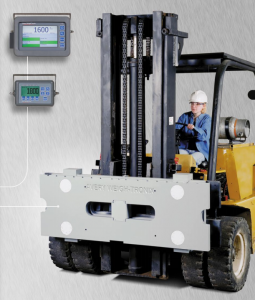
Designed for use in shipping facilities, warehouses, recycling plants, cargo loading docks, factory floor production environments, and so forth, the forklift scale and pallet jack scale weighing systems integrate weight and data management into one seamless operation to help companies increase efficiency and accuracy.
How Do You Weigh a Truck with Portable Scales?
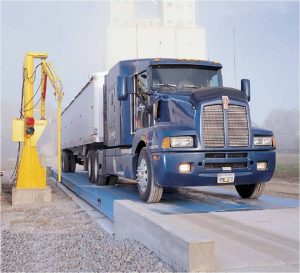
Which Floor Scale is Right for Your Application?
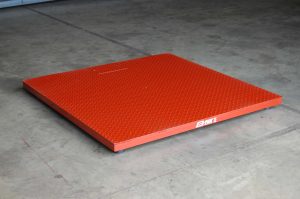
What’s the Difference Between Dimensional Weight and Actual Weight?

Dimensional scales are precision instruments that rapidly calculate the weight and volume of an item, object, or parcel. They commonly utilize industrial-grade sensing technology to determine the cubic dimensions of the item. They also incorporate a precision scale that produces accurate weight readings. The best dimensional scales are precision instruments built to operate for many years in various industrial applications. (more…)
Lean Manufacturing for Better Performance

Removing Non-Value-Added Components From Production
Those non-value-added components in the process measure waste in any production system to make and deliver a finished product. Lean manufacturing removes the non-value-added components from production. The process improves efficiency, productivity, product cycle time, lowering material costs, reduced scrap, which can lower total operational costs and improve competitiveness. One aspect of realizing savings in a lean system is by following lean management principles in weighing.
How Weight Systems Play an Integral Role in Lean Manufacturing
Weighing plays an important role in nearly all manufacturing processes. In fact, goods and commodities are sold based on weight, meaning that their weight determines the value of a product or material.
By introducing lean management principles in weighing, companies can further reduce non-value-added components from their production processes. Weighing helps to keep costs at a minimum by avoiding waste. It speeds up manual processes with smart display functions and decreases downtime with reliable, high-quality equipment. It also achieves traceability with integrated data-capture solutions.
Managing Inventory
Managing inventory is a good way to keep costs at a minimum and avoid waste. Warehouses with excess raw materials, unfinished products, or finished products that have exceeded demand or an immediate need are just some examples of inventory waste. Keep track of material on hand by using floor scales to weigh in deliveries at receiving. Track inventory of goods by counting them with high-precision counting scales as they enter the warehouse or upon production. Even the smallest quantities of high-value goods can be counted. Warehouse floor scales or pallet scales can verify complete batches.
Over-Production
Over-production is also wasteful. Manufacturing products before they are needed or simply producing more than necessary adds to costs. More importantly, as it relates to inventory, such excess is indicative of inefficiencies in the system. Inventory can be managed by incorporating weight production output at the end of production lines. Weighing output signals users to stop production at the right time. It also verifies stock quantities more easily. Other weighing system applications for inventory control include using scale-assisted parts counting can provide exact material counts at workstations. Also, to ensure precise package counts and weights, scale-assisted packing of boxes or containers can be employed to prevent under or over-filling before shipping.
Speeding Up Production
Conveyor belt scales eliminate waste on production lines by speeding up manual processes that would otherwise be labor-intensive. Belt scales rid the time-consuming and ineffective method where each product would be weighed individually and returned to the conveyor. Conveyor weighing systems are not only more efficient and cost-effective in streamlining production, but smart display functions on the scales allow for easy monitoring and recording of values. Smart display features collect, store and transmit weight data. Some systems can use wireless communication to transmit data and be linked to computers, printers, barcode scanners, and other peripherals, and integrated into networks.
Data is Key
Integrated data-capture solutions eliminate waste by allowing for easy tracking and traceability. Smart data-capture technology can weigh a product, save the data, and other vital details such as date and time, number of pieces, location, and other data. Mobile weighing solutions can significantly reduce the amount of transport time of a product. For example, forklift scales allow operators to lift and weigh bundled products as the materials are being moved into storage upon delivery. The weight, origin, and storage location are then transmitted while being placed in the warehouse. The process offers real-time data acquisition that is transmitted wirelessly for billing and inventory control.
Lean manufacturing systems can reduce and eliminate waste and maximize the value of manufacturing processes. By following lean management principles in weighing, companies can achieve high-quality products, prompt deliveries, as well as time and inventory efficiencies. An effective weighing system offers an efficient and logical workflow for companies.
How to Count Small Parts More Efficiently and Accurately
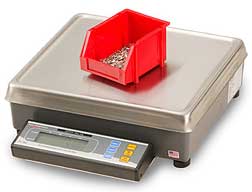
What You Need to Know About Scale Repair and Calibration
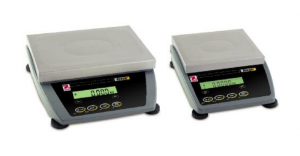
Why an ISO 17025 Accreditation Matters When Choosing an Industrial Scale Company

Benefits of Using Digital Platform Scales
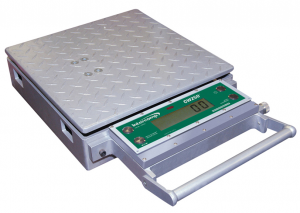
Because weight management is essential in various industries, precision weighing systems are vital for companies. Where mechanical platform scales once provided managers with limited weight management options, advancements in technology now offer precision and accuracy once unobtainable. Today, digital platform scales provide cost-effective solutions and ensure consistency, detail, and efficiency for companies that mechanical scales cannot attain. (more…)
Industry Insight: Conveyor Weighing Systems to Measure Your Applications
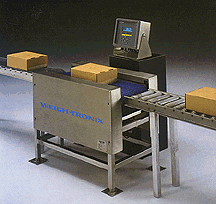
Pocket Guide: Heavy Duty Dimensional Scales
If you’re in an industry that requires accurate weighing systems (which is, realistically, most industries in America), you’ll want to educate yourself on a very important tool used by businesses across the country – the dimensional scale.
We’ve put together a quick and easy pocket guide for you to review the ins and outs of heavy duty dimensional weighing scales, what they’re used for, and why they’re likely invaluable to your company. (more…)
Factors to Consider When Using Precision Weighing Systems
Weight plays a critical role in the industrial sphere, including every detail from product purchase and sales to shipping and receiving. In order to keep up with technology advancements, industries need their weight management to be accurate and efficient, which is where precision weighing systems come into play.
Possibly the main advantage of precision weighing systems is that all calculations are performed within the system, which not only allows for remote control but also greatly reduces human error. In order to successfully utilize your precision weighing system to its full extent with the lowest risk of error, there are a variety of factors to consider to ensure that it’s handled properly. (more…)

